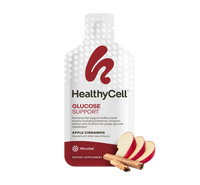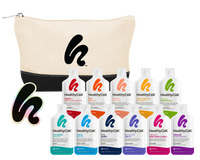While it’s the sunflower’s big, bright yellow petals that make us smile, it's the plant's seeds at the center of the flower-head that are the sunflower's real story. Each of the oil-packed seeds is a treasure trove of vitamins, minerals, and healthy fats, all able to provide a variety of health benefits — everything from better cardio to boosted immunity. Read on and get the full sunflower oil story.
What Is Sunflower Oil?
Pressed from the plant’s seeds, sunflower oil is a wonderful source of natural nutrients supplying many of the vitamins, minerals, healthy fats, and antioxidants that we need to keep our bodies healthy. Sunflower oil has a mild taste and light color and provides more vitamin E than any of the other plant-derived oils. The oil is a combination of all three types of fatty acids: monounsaturated fat, polyunsaturated fat, and low levels of saturated fat. Nutrients found naturally occurring in sunflower oil include vitamin E, selenium, folate and magnesium, copper iron, and zinc.[1]
The Top 3 Sunflower Oil Benefits
1. A rich source of vitamin E and a powerful antioxidant
Sunflower seeds and their extracted oil are nature’s best whole food source of vitamin E. Most of the vitamin E in sunflower oil is in the form of alpha-tocopherol, the most beneficial, natural, and biologically active form of the vitamin. An ounce of sunflower seeds or the equivalent in oil provides 76 percent of the Recommended Dietary Allowance (RDA) for vitamin E, which makes sunflower seeds and sunflower oil the richest, most concentrated whole-food source of the vitamin.[2]
Vitamin E is also an antioxidant, meaning it prevents the body from experiencing damage caused by destructive, electrically unbalanced chemicals called free radicals, which can harm cells and tissues. The body also requires a supply of vitamin E to keep the immune system working to subdue microscopic invaders. [3]
2. Sunflower oil can lower “bad” LDL cholesterol
Research has shown that LDL, or “bad,” cholesterol levels can be lowered by consuming foods rich in phytosterols: biochemical compounds similar to human cholesterol but manufactured in plants. Among the most commonly consumed nut and seed snack foods, sunflower kernels have been found to be among the richest in phytosterol content.[4] Clinical studies have determined that by daily consumption of 2 to 3 grams of phytosterol-rich foods like sunflower seeds or seed oil, individuals are able to reduce their bad cholesterol levels by about 10 percent over a three-to-four-week period.[5]
3. Sunflower oil helps prevent coronary heart disease
Nearly 90 percent of the fat in sunflower oil is the healthiest type for the heart, the “good” unsaturated fat. According to studies, substituting “good” unsaturated fats for saturated fats and trans fats is one of the most effective strategies for preventing coronary heart disease.[6]
Health Benefits of Sunflower Oil Now Available in a Nutritional Supplement
With its rich vitamin E content and blend of good fats, sunflower oil is one of the powerful health-conducive ingredients found in Healthycell’s pill-free multivitamin, Bioactive Multi. This is a broad spectrum of essential vitamins and minerals made with a new delivery technology called MICROGEL™ that uses a prebiotic gel matrix to deliver a broad spectrum of extremely small, dissolvable nutrient particles in highly bioavailable forms to make it easier for your body to absorb the nutrients it needs without irritating the gut.
Key Takeaway: Sunflower oil keeps cholesterol, blood lipids, free radicals in check
This blend of friendly fats squeezed from the seeds of sunflowers will keep saturated fats and trans fats at bay while lowering cholesterol, building heart health, and slowing cellular aging.
REFERENCES
[1] National Sunflower Association, Nutrition News & Notes, “Sunflower Seeds Deliver a Winning Team of Nutrients”
[2] National Sunflower Association, “Facts About Vitamin E” Nutritional Power of Sunflower Seeds and Oil
[3] US National Library of Medicine: Medline Plus – Medical Encyclopedia “Vitamin E”
https://medlineplus.gov/ency/article/002406.htm
[4] Phillips KM1, Ruggio DM, Ashraf-Khorassani M “Phytosterol composition of nuts and seeds commonly consumed in the United States” J Agric Food Chem. 2005 Nov 30;53(24):9436-45.
[5] Katan MB, Grundy SM, Jones P, Law M, Miettinen T, Paoletti R; Stresa Workshop Participants.
“Efficacy and safety of plant stanols and sterols in the management of blood cholesterol levels.
Mayo Clin Proc. 2003 Aug;78(8):965-78.
[6] Shrapnel WS1, Calvert GD, Nestel PJ, Truswell AS. “Diet and Coronary Heart Disease”
Med J Aust. 1992 May 4;156 Suppl:S9-16.




